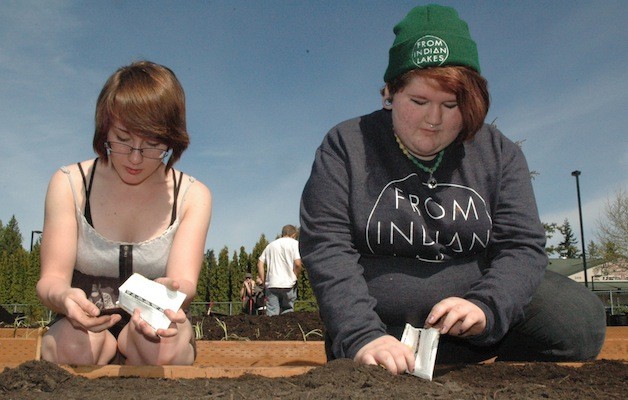TULALIP — The unloading of a truck full of compost at the Marysville Arts & Technology High School on Wednesday, April 30, represented the culmination of a six-year dream for Arts & Tech math teacher Karen McCaffrey, and a unique opportunity for Arts & Tech students get dirty while growing their own food.
“Last year, we finally started a club devoted to growing local food,” McCaffrey said. “Not only is the process of gardening a valuable experience, but it teaches these kids how essential these foods are to their health and well-being.”
The Arts & Tech gardens benefitted from the fourth annual Compost Days campaign — jointly coordinated by Cedar Grove, Waste Management, King County and Seattle Public Utilities — which conducted its Big Garden Give, the region’s first compost drive, providing free compost to 120 gardens that grow food for low-income communities in Snohomish and King counties.
John Inge, marketing director for Cedar Grove, stopped by the school that Wednesday with Zsolt Pasztor, production manager of Farmer Frog, to watch the final truckload of compost get dumped next to the Arts & Tech gardens.
“Throughout Snohomish County, we’ve contributed 500 yards of compost to as many as 20 community gardens,” Inge said. “Yesterday, we dropped off about 10 yards, and today, we’re adding about 15 yards to the Arts & Tech school gardens. As much as we talk about the compost loop, it’s incredible to witness personally how the food and yard waste that we receive is now being used to grow fresh food, rather than going into landfills.”
Inge credited Washington State University with helping to connect Cedar Grove, and the other members of the Compost Days campaign, to community organizations, as well as assisting in coordinating their efforts.
“They’ve been invaluable in linking us to deserving recipients,” Inge said. “This way, we can provide support to gardens that serve all segments of the community.”
As the Arts & Tech students shoveled compost into wheelbarrows and poured it into the eight-foot by four-foot garden beds behind the school building, Pasztor explained the process that Farmer Frog facilitated beforehand.
“It started with the ground being covered with burlap, so that no light would reach the ground,” Pasztor said. “Wood chips were then laid down over the burlap, about four to six inches deep. We have a source of burlap and a connection with loggers to get the wood chips, which amounted to about 10 yards, covering a 20-foot by 30-foot area.”
From there, 16 garden beds were built over the wood chips, with pressure-treated lumber, of which eight were filled with the 10 yards of compost from Cedar Grove on Tuesday, April 29.
“We received 15 yards of compost today, which would probably fill 12 garden beds, but it’s better to have too much than not enough,” Pasztor said on April 30. “We also provided eight 10-gallon buckets with compost and strawberry plants. There’s a growing distance between people’s food and how it’s made, so we want to bring people closer to that food-making, so that they don’t just think of food as coming from Safeway or Albertsons.”
Pasztor also anticipates that Arts & Tech students will be able to apply their lessons in biology in a hands-on fashion in their gardens, perhaps even by doing experiments to see which factors cause plants to grow better.
The Arts & Tech students who volunteered to work the dirt and plant seeds on April 30 agree that they’re seeking closer connections, not only to the source of their food, but also to the community around them.
“I just like growing things,” said sophomore Emalee Alaniz, as she watered one of the garden beds. “It’s nice when you can grow your food more naturally.”
“I like that everyone here has come together as a team to make this happen,” said senior Nikki Cooley, who joined Alaniz in planting seeds in the compost. “I don’t usually get to work with all of these people, so I’m getting to know new people while I’m gardening, which is something I’m already experienced at. When you go to the store, you have to worry whether their fruits and vegetables have been treated with chemicals, but our fruits and vegetables will not only be locally grown, but they’ll be fresh, healthy and delicious.”
“It’s a healthier alternative,” agreed fellow senior Damon Diel Jr. “It also helps save money for the school.”
McCaffrey explained that the food grown in the Arts & Tech gardens would be prioritized, first to go to the students who helped grow it, then to go to community members in need who would be invited to take part in gardening there, with any remaining or leftover food likely going to community groups such as the Marysville Community Food Bank.
“This garden will be a source of ongoing joy for generations to come,” Marysville Arts and Technology High School Principal Terri Kaltenbach said.
The annual Compost Days campaign is a thank-you to area residents for diverting 350,000 tons of food, food soiled-paper and yard debris from landfills. From March 15 through April 15, residents received deep discounts on compost, and donated 30,200 bags of compost in turn, to help grow food in 120 gardens that feed communities.
“Making locally produced compost available to community gardens is an important first step in providing nutritious food for those that need it the most,” said Candy Castellanos, public education outreach manager for Waste Management. “Using compost is the most sustainable, environmentally supportive and efficient way to garden, and we are proud to play a role in growing gardens locally.”
For more information, visit www.compostdays.com.



